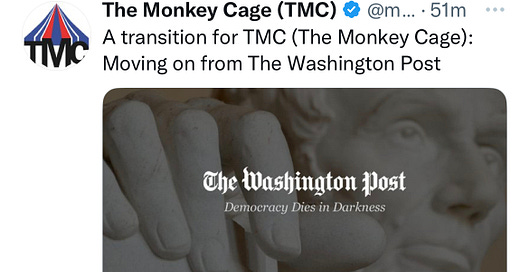The Monkey Cage takes a sabbatical
It's the end of an era. You'll just have to wait to see what comes next.
It’s official: as you may have heard on Twitter, The Monkey Cage’s partnership with the Washington Post ends on December 31.
It’s the end of an era. I joined TMC’s editorial team way back in early 2014, around the time it moved to the Washington Post, after four years of editing the late, lamented Middle East Channel for Foreign Policy. I’ve been proud to be a part of the TMC project for so many years. The Post offered us a tremendous platform for bringing rigorous scholarship to the broader policy public, and became a central node in the field of political science. It will be missed — at least until it returns tan, rested and ready from a well-deserved sabbatical. (I know I could use one!)
How central, and how tremendous, a platform was the TMC for political scientists? Way back in 2016 I wrote an article for Perspectives on Politics entitled “Political Science in Real Time.”
The rise of political science public engagement has been so massive and rapid that it is paradoxically easy to miss. A decade ago, very few political scientists had either the opportunity or the incentive to engage with the political public in a direct, unmediated way. Today, it would be difficult for a political scientist to not be able to find a platform to publish policy interventions. There is a dense and eclectic ecosystem of political science and international relations-focused blogs and online publications, where good work can easily find an audience through social media….
Since its launch, the Monkey Cage alone has published more than 8,000 articles featuring nearly 1,500 different political scientists. Virtually every political or cultural magazine of note now offers a robust online section featuring commentary and analysis in which political scientists are well represented.
This has transformed publication for a broader public from something exotic to something utterly routine.
That’s not all due to TMC, of course, but it certainly played a big part for political scientists. Two little data tidbits: in the article, I cite a then-recent TMC contributor survey which found that “two-thirds of respondents believed that the discipline valued public engagement, and three-quarters said the same about their departmental colleagues.” That’s a big normative shift from the days when such public engagement was viewed as unserious and something which rising scholars would best avoid. And in our recent Middle East Scholars Barometer survey, we found that “even though political scientists were 12 percentage points less likely than scholars from other disciplines to view the general public as an audience for their research, political scientists were 15 points more likely to have published an online post about their research in the past three years.” Maybe that 27 point variance represents the TMC Effect? At any rate, there’s a lot more about the “golden age” (as called it in the article) and I’m happy to share a PDF if anyone’s interested and doesn’t have access.
A lot has happened to the online public for political science engagement in the intervening six years. The contours and platforms of the broader online public sphere have evolved in ways both positive (the return of blogging via Substack?) and negative (looking at you, Twitter). We’ve seen the norm of public engagement seep into the bedrock of disciplinary norms, and sometimes the sort of backlash against that new norm which tends to happen. We’ve seen evidence of the impact of such public engagement, and more than one crisis of faith in its value (especially during the Trump years). We’ve seen the desperate search for virality shaping content. We’ve seen the rise of a class of academic online influencers (for lack of a better word) which occupy a very different niche in the ecosystem than the episodic, research based engagement celebrated in my article. We’ve seen the growing importance of new platforms like TikTok which few of us have figured out how to effectively handle. And of course we’ve seen the rise of political polarization, digital misinformation, bot armies, political intimidation and toxic advocacy campaigns which have made the online space awfully miserable and unrewarding for many would-be engagers.
I’ll have more to say about what all that means for political science public engagement in a different format soon, but overall I think that we all need to think carefully and in new ways about how to engage with this current policy public sphere. Within limits, of course - I’m not learning any of those TikTok dances.
What happens now? Well, as our announcement said, TMC itself is taking a sabbatical while the editorial collective puts together a new independent, standalone version. I’m truly excited about the ideas we’ve been discussing for TMC 3.0; we will share them when the time is right. In the interim, expect to see more content on MENA issues in the news here on my blog, with more guest contributors in traditional and new formats. Onward and upward!




